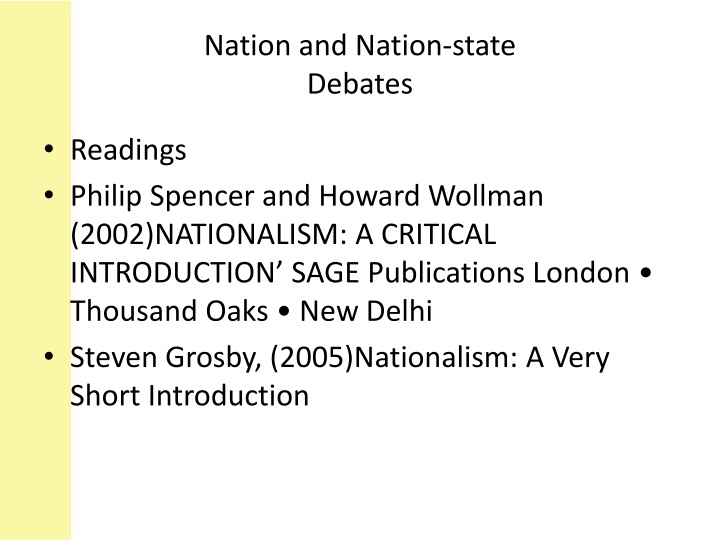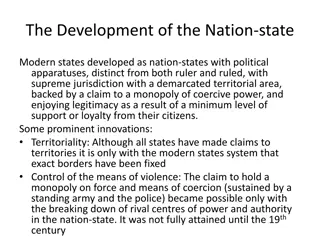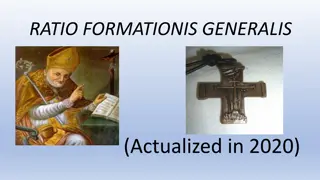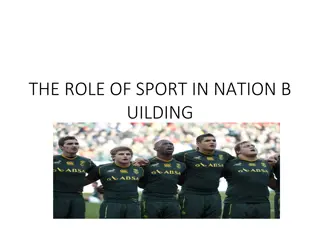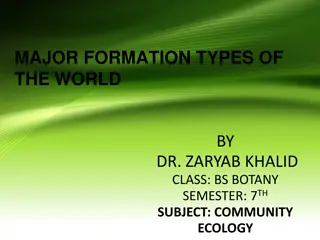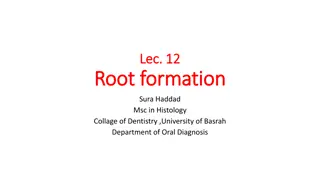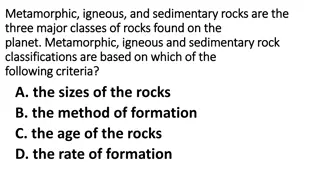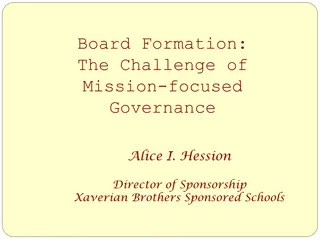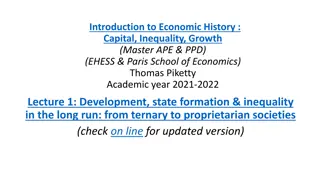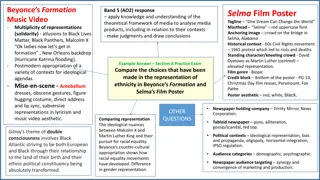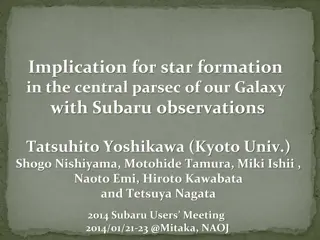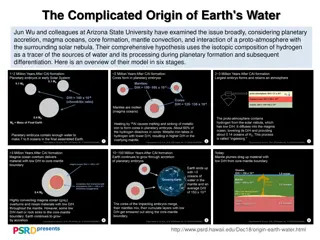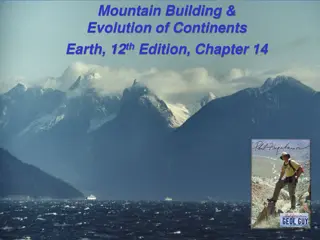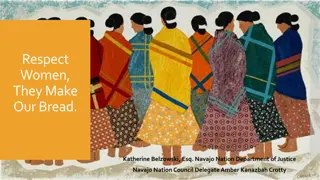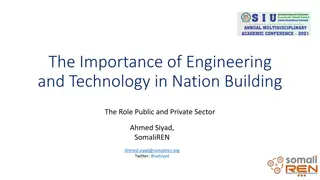Evolution of State Formation and Nation-Building: A Historical Perspective
Explore the intricate evolution of state formation and nation-building throughout history, examining various patterns and phases from the origins of the state to the emergence of nationhood. Delve into the critical intersections between state institutions, nation-building processes, and the idea of the nation, reflecting on the impacts of revolutions, wars, and globalization on the development of modern states and national identities.
Download Presentation

Please find below an Image/Link to download the presentation.
The content on the website is provided AS IS for your information and personal use only. It may not be sold, licensed, or shared on other websites without obtaining consent from the author.If you encounter any issues during the download, it is possible that the publisher has removed the file from their server.
You are allowed to download the files provided on this website for personal or commercial use, subject to the condition that they are used lawfully. All files are the property of their respective owners.
The content on the website is provided AS IS for your information and personal use only. It may not be sold, licensed, or shared on other websites without obtaining consent from the author.
E N D
Presentation Transcript
Nation and Nation-state Debates Readings Philip Spencer and Howard Wollman (2002)NATIONALISM: A CRITICAL INTRODUCTION SAGE Publications London Thousand Oaks New Delhi Steven Grosby, (2005)Nationalism: A Very Short Introduction
Origin of State: A Brief History Human history shows that there have been times when the state as we know it today, controlling all important aspects of our life, did not exist. The modern state established a centralized supreme authority and rightful claim to obedience from its subjects. States originated in many different ways in different places.
State Formation The first pattern is represented by states mostly in medieval monarchies such as Britain and France that arose on the basis of the gradual transformation of existing political units. The second pattern, predominant in the 19th century, comes from those states that mainly emerged with unification of different dispersed political units, for example, Germany and Italy. The third pattern of states formation is reflected by those states that emerged with the breakup of empires and heterogeneous states, for example, Ottoman and Austro-Hungarian Empires. After the Second World War, many new territories gained statehood.
State Formation and Nation-Building: Stein Rokkan The first phase was the formation of state institutions, for example, an army, a bureaucracy and its gradual consolidation. The second phase of nation-building was referred to as standardization that involved connecting the people and inculcating a shared sense of belonging. The third phase referred to as mass democracies helped in establishing democratic states with larger participation of population. Welfare state characterized by redistribution and equality of opportunity was created particularly in north-western Europe after the Second World War.
Overlapping and Coinciding Phases of State Formation Process of state formation was not uniform. Revolution, war or foreign occupation changed the whole process resulting in phases being overlapped or coincided. The world saw the rise of fascist state, Mussolini in Italy, Hitler in Germany, Franco in Spain, Salazar in Portugal and communism in Russia. Welfare state was criticized for too much bureaucratic interference and inefficiency. With the rise of globalization and liberalization, the idea of decline of state emerged.
Idea of Nation With the French Revolution, nation as a community of citizens and political entity emerged. Nation has thus become at once a cultural entity (the original connotation of the term) as well as a political entity.
Are Nation and State Intertwined? Nation emphasizes the (collective) subjectivity of the community; it is about identity, shared history, language and culture. The state is objective; it concerns people, territory and institutions.
Does the State Presuppose a Nation? To create legitimate structure of authority when people voluntarily accept laws and policies, and pay their taxes inculcating an idea of belonging is important. If the state is able to provide security, justice and social services, wouldn t that be enough to build the necessary loyalty. For stability, it is important for a nation-state to be inclusive.
Does the Nation Presuppose a State? Can we imagine a nation to exist without the state? How important is the shared identity of people, distinct from other groups?
The term nation-state implies that the nation and state concur in a manner that state prefers to adopt and endorse a specific cultural group in order to have a stable system. Meaning of the term nation and the experience of the national population vary vastly across the continents. Context and history give different connotations to concepts.
Approaches to Understanding Nation-State Primordialist Perennialism Modernism Cultural and political nation Civic and ethnic dimension World polity theory Post-colonial perspective
Legacy of Treaty of Westphalia The origin of a modern nation-state is traced in Europe, and the Treaty of Westphalia is referred as the landmark. It established the principle of sovereignty. It set an example of peace achieved by diplomatic congress. Political order based upon the notion of coexisting sovereign states emerged.
Nation-State in Post-colonial Contexts Since the end of the Second World War, the number of independent states has increased. Challenge to build nation-states from often different groups sharing a space drawn during colonial times. These states are facing different challenges in the process of nation- and state-building.
Should Postcolonial Societies Follow Western Model of State? Different trajectories of nation- and state-building. Asia and Africa are struggling with weak economic structures and different types of challenges with liberalization and globalization of economies. For most of the post-colonial societies, territorial identification has not displaced affinities based on language and religion. Weak and fragmented civil society. State is absent and on the other different actors, networks, and loci of power fill the void of the absent nation-state . Demand for a strong state and a strong leader leading to some kind of authoritarianism.
Decline of State Debate: Kenichi Ohmae, John Noisbitt and Susan Strange Kenichi Ohmae predicted the end of the nation-state As a result of globalization, states are losing authority and influence Domain of state authority in society and economy is shrinking Competition for market not for territory Rise of international NGOs Changing nature of conflicts Environmental threats and rise of global civil society
State-centric arguments: Linda Weiss, Robert Gilpin and Ethan Kapstein State-centric scholars have trust in state powers even in changed scenario of globalization State sovereignty and decline debate The modern nation-state remains the most important source of power and wealth in the globalized world State, main actor in modern warfare
States are becoming stronger in some respects and weaker in others and the process of state transformation plays out differently in different states (Brenner et al. 2003; Held and Mcgrew 2002; Jessop 2002) Rising forte of nationalism Changing role of state and economy in a globalized world Relevance of citizenship New global form of sovereignty is what is referred to as empire
